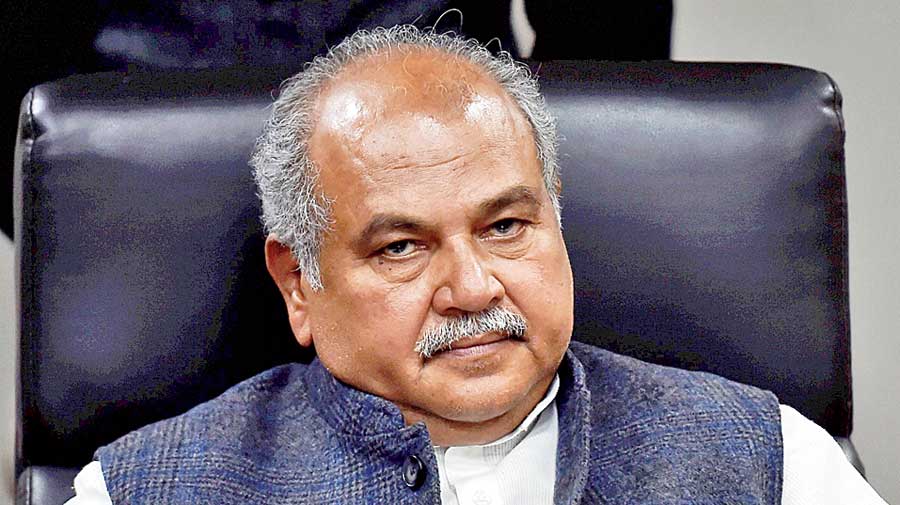Amid farmers protest against three contentious farm laws at Jantar Mantar here, Agriculture Minister Narendra Singh Tomar on Friday informed Parliament again the government is always open for discussion to resolve the issue. For over seven months now, thousands of farmers, mainly from Punjab, Haryana and western Uttar Pradesh, have been camping at Delhi's borders in protest against the three laws that they say will end state procurement of crops at MSP.
Out of them, a small group of 200 farmers are staging a protest against the farm laws at Jantar Mantar -- only a few hundred metres from the Parliament Complex -- in central Delhi after getting a special permission from Delhi government. "Government is always open to discussion with farmers unions and will remain open to discussion with agitating farmers to resolve the issue," Tomar said in a written reply to the Rajya Sabha.
Asserting that the government engaged itself actively and constantly with the agitating farmer unions to end the protests, the minister said that 11 rounds of negotiating talks were held between the government and agitating farmers to resolve the issues.
"However, farmer unions never agreed to discuss the farm laws except for demanding their repeal," he said. In the last meeting on January 22, the government's negotiations with 41 farmer groups hit a roadblock as the unions squarely rejected the Centre's proposal of putting the laws on suspension.
During the 10th round of talks held on January 20, the Centre had offered to suspend the laws for 1-1.5 years and form a joint committee to find solutions, in return for protesting farmers going back to their respective homes from Delhi's borders.
The three laws -- The Farmers' Produce Trade and Commerce (Promotion and Facilitation) Act, 2020, The Farmers (Empowerment and Protection) Agreement of Price Assurance and Farm Services Act, 2020, and The Essential Commodities (Amendment) Act 2020 -- were passed by Parliament in September last year.
Asked if consultations were held before introducing the bills, Tomar said various committees/task force were constituted recommending for several market reform measures to remove restrictive provisions impeding development of an efficient and competitive marketing system, for promotion of direct marketing, and for encouraging contract farming.
They also recommended rationalisation of market fee/tax structure, deregulation of the marketing system to promote investment in market infrastructure, motivating corporate sector to undertake direct marketing and to facilitate a national integrated market, he said.
Further, the minister said that during COVID-19 lockdown due to disruption of markets and supply chains, there was utmost need to allow free direct marketing outside the mandis to facilitate the farmers in selling their produce near to farm gate at remunerative prices.
As COVID-19 situation may have a prolonged effect globally on demand side, hence the urgency for promulgation of Ordinances, to provide a new facilitative framework to promote barrier free inter-state and intra-state trade to increase market accessibility for farmers to enhance their income, he added.
The minister also said that the draft of the Ordinances had been circulated to various Ministries/ Departments; NITI Aayog etc, for their comments.
State governments were also consulted through video conferencing (VC) on May 21, 2020, which was attended by the officials of various states/ Union Territories (UTs), to obtain feedback on new legal framework facilitating barrier free inter-state and intra-state trade in agriculture produce to provide a choice to farmers, he added.
"Government of India has proactively undertaken efforts on a series of extension activities through webinars, online conferences, workshops, teleconferencing, social media, print media, electronic media with the stakeholders on the aforesaid three Ordinances and thereafter on respective Acts," he said.
Asked how the government will ensure payment of minimum support price (MSP) to farmers after implementation of the farm laws, Tomar said the MSP policy has nothing to do with Farm Acts. Farmers are free to sell their produce to government procurement agencies at MSP or Agricultural Produce Market Committee (APMC) markets or through contract farming or in the open market whichever is advantageous to them, he said. The centre announces MSP for 22 major agricultural commodities of Fair Average Quality (FAQ) each year in both the crop seasons after taking into account the recommendations of the Commission for Agricultural Costs and Prices (CACP). The government also extends remunerative prices to farmers through its various intervention schemes. The procurement at MSP is being done by central and state agencies under various schemes of the government. Besides, the overall market also responds to declaration of MSP and government's procurement operations, results in increase of selling price of the various notified crops, the minister added.
The Supreme Court has put on hold the implementation of the three laws till further orders and set up a committee to find solutions. The committee has already submitted the report.
Farmer groups have alleged that these laws will end the mandi and MSP procurement systems and leave the farmers at the mercy of big corporations, even as the government has rejected these apprehensions as misplaced.

